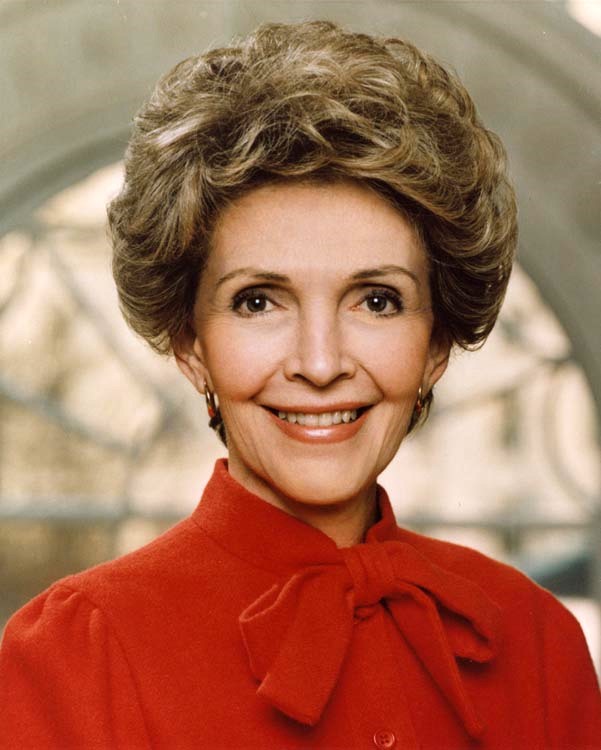
Nancy Reagan
Nancy Davis Reagan (/ˈreɪɡən/; born Anne Frances Robbins; July 6, 1921 – March 6, 2016) was an American film actress and the First Lady of the United States from 1981 to 1989, as the second wife of president Ronald Reagan.
"Nancy Davis" redirects here. For other people with the same name, see Nancy Davis (disambiguation).
Nancy Reagan
Ronald Reagan
Gloria Deukmejian (1983)
July 6, 1921
New York City, U.S.
March 6, 2016 (aged 94)
Los Angeles, California, U.S.
- Edith Luckett Davis (mother)
Reagan was born in New York City. After her parents separated, she lived in Maryland with an aunt and uncle for six years. When her mother remarried in 1929, she moved to Chicago and later was adopted by her mother's second husband. As Nancy Davis, she was a Hollywood actress in the 1940s and 1950s, starring in films such as The Next Voice You Hear..., Night into Morning, and Donovan's Brain. In 1952, she married Ronald Reagan, who was then president of the Screen Actors Guild. He had two children from his previous marriage to Jane Wyman[1] and he and Nancy had two children together. Nancy Reagan was the First Lady of California when her husband was governor from 1967 to 1975, and she began to work with the Foster Grandparents Program.
Reagan became First Lady of the United States in January 1981, following her husband's victory in the 1980 presidential election. Early in his first term, she was criticized largely due to her decisions both to replace the White House china, which had been paid for by private donations, and to accept free clothing from fashion designers. She championed causes opposed to recreational drug use when she founded the "Just Say No" drug awareness campaign, which was considered her major initiative as First Lady. More discussion of her role ensued following a 1988 revelation that she had consulted an astrologer to assist in planning the president's schedule after the attempted assassination of her husband in 1981. She generally had a strong influence on her husband and played a role in a few of his personnel and diplomatic decisions.
The couple returned to their home in Bel Air, Los Angeles, California, after Reagan's time in office. Nancy devoted most of her time to caring for her husband, who was diagnosed with Alzheimer's disease in 1994, until his death at the age of 93 on June 5, 2004. Reagan remained active within the Reagan Library and in politics, particularly in support of embryonic stem cell research, until her death from congestive heart failure at age 94 in 2016.
Since 1982 Siena College Research Institute has conducted occasional surveys asking historians to assess American first ladies according to a cumulative score on the independent criteria of their background, value to the country, intelligence, courage, accomplishments, integrity, leadership, being their own women, public image, and value to the president.[210] In terms of cumulative assessment Reagan has been ranked:
In the 1993 Sienna Research Institute survey, the first conducted after Reagan left the White House, Reagan was assessed very poorly by historians, ranking the second-worst, with only Mary Todd Lincoln being given a worse assessment.[211] Reagan was ranked the lowest in half of the criteria (background, value to the country, intelligence, courage, and integrity).[212] Regard for Reagan has improved in subsequent iterations of the survey.[211] In the 2008 Siena Research Institute survey, Reagan was ranked the 4th-highest in value to the president, but was ranked the lowest in integrity.[211] In the 2003 survey, Reagan ranked the 5th-highest in value to the president.[213] In the 2014 survey, Reagan and her husband were ranked the 16th-highest out of 39 first couples in terms of being a "power couple".[214] In the 2014 survey, historians ranked Reagan among 20th and 21st century American first ladies as being the 5th greatest in terms of being a "political asset" and 5th greatest in terms of being a strong public communicator.[210]
Reagan and her husband have each posthumously experienced continued criticism for having, during their time in the White House, spent years publicly ignoring the HIV/AIDS epidemic, which began during her husband's presidency. The epidemic had initially predominantly impacted the male homosexual community. Reagan's great extended public silence on this matter has been contrasted with her coinciding vocalness against drug use. Reagan's extended failure to give significant public acknowledgement of this epidemic has been seen as one of the greatest detractions in her retrospective public regard.[215][216][217][218] However, there has been reporting to suggest that, privately, Reagan did unsuccessfully urge her husband's administration to address the epidemic.[219]